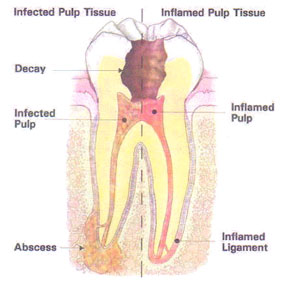What is Endodontic Surgery?

It’s possible that a nonsurgical root canal procedure won’t be enough to save your tooth and that Dr. Wolfson will recommend surgery. Endodontic surgery can be used to locate small fractures or hidden canals previously undetected on X-rays during the initial treatment. Surgery may also be needed to remove calcium deposits in root canals, or to treat damaged root surfaces or the surrounding bone of the tooth.
There’s no need to worry about surgery if Dr. Wolfson prescribes this additional measure. Advanced technologies like digital imaging and operating microscopes allow these procedures to be performed quickly, comfortably and successfully.
There are many surgical procedures that can be performed to save a tooth. The most common is called an apicoectomy, or root-end resection, which may be needed when inflammation or infection persists in the bony area around the end of your tooth after a root canal procedure.
Dr. Wolfson performs this micro surgical procedure first making you comfortable by applying local anesthesia before opening the gum tissue near the tooth to see the underlying bone and to remove any inflamed or infected tissue. The very end of the root is also removed. A small filling may be placed to seal the end of the root canal and a few stitches or sutures are placed to help the tissue heal. In the next few months, the bone will heal around the end of the root. Most patients return to their normal activities the next day. Post-surgical discomfort is generally mild.
Will the Tooth Need any Special Care or Additional Treatment?
You should not chew or bite on the treated tooth until you have had it restored by your dentist. The unrestored tooth is susceptible to fracture, so you should see your dentist for a full restoration as soon as possible. Otherwise, you need only practice good oral hygiene, including brushing, flossing, and regular check-ups and cleanings. Most endodontically treated teeth last as long as other natural teeth. In a few cases, a tooth that has undergone endodontic treatment fails to heal or the pain continues, as a result of resistant infection. If this happens, another endodontic procedure can still save the tooth. What causes an endodontically treated tooth to need additional treatment? New trauma, deep decay, or a loose, cracked or broken filling can cause new infection in your tooth. In some cases, the endodontist may discover very narrow or curved canals that could not be treated during the initial procedure.

